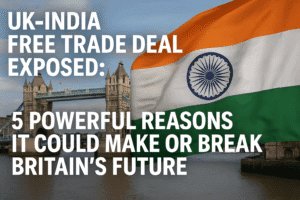UK-India Free Trade Deal EXPOSED: 5 Powerful Reasons It Could Make or Break Britain’s Future
Keir Starmer’s upcoming India trip aims to formally sign a landmark UK-India trade deal, touted as Britain’s most valuable agreement since Brexit with a projected £4.8 billion GDP boost by 2040. Beyond the ceremony, the deal strategically anchors the UK in the Indo-Pacific while offering India diversified partnerships. Key winners include UK whisky, aerospace, and medical exports facing slashed Indian tariffs, and Indian textiles/food producers gaining UK market access.
However, contentious concessions exempting Indian workers from UK payroll taxes create a political minefield, and the critical accompanying investment treaty remains unfinished. Crucially, the unpublished legal text – withheld until after signing – obscures implementation hurdles and delays democratic scrutiny. While promising new opportunities for businesses and consumers in both nations, the deal’s true success hinges on navigating post-signing complexities over the coming decade. The signing marks not an endpoint, but the start of the real work.

UK-India Free Trade Deal EXPOSED: 5 Powerful Reasons It Could Make or Break Britain’s Future
Keir Starmer’s upcoming trip to India to sign the long-negotiated UK-India Free Trade Agreement (FTA) is more than just a photo op. It represents a pivotal moment for Britain’s post-Brexit economic strategy and a significant shift in the global trade landscape. Here’s a deeper dive into the substance and implications:
- The Brexit Litmus Test: This deal is being touted as the UK’s most valuable since leaving the EU. The projected £4.8 billion GDP boost by 2040 isn’t just a number; it’s a crucial benchmark for the “Global Britain” vision. Success here validates the argument that the UK can secure advantageous deals independently. Failure, or even underwhelming results, would fuel criticism of the Brexit project. The pressure is on Starmer to deliver tangible results beyond the signing ceremony.
- Winners and Losers – The Sectoral Shakeup:
- UK Wins: Dramatic tariff reductions are the headline. Scotch whisky producers, burdened by India’s crippling 150% duty, see an immediate halving and a path to 40% – a lifeline for a key export industry. Aerospace, medical devices, machinery, and certain agricultural goods also gain significant new market access. The £1 billion in tariff savings over a decade translates directly to improved competitiveness and potential job growth in these sectors.
- India Wins: Textiles, footwear, and food producers (especially frozen prawns) gain easier entry into the UK market. The reported “unprecedented” win on not requiring Indian workers in the UK to pay employee National Insurance contributions is a major concession, effectively reducing labor costs for Indian companies operating in Britain. This is politically sensitive domestically for the UK.
- Sensitive Balances: The auto sector deal (100% down to 10%) includes quotas, acknowledging the need to protect domestic manufacturers on both sides. The lack of significant new Indian student visas highlights UK political constraints on immigration, despite Indian desires.
- The “Unfinished Business” – The Investment Treaty: While the FTA grabs headlines, the accompanying Bilateral Investment Treaty (BIT) remains under negotiation. This treaty is critical for providing legal protections and confidence for major cross-border investments. Reynolds and Goyal’s meeting underscores that the real work isn’t over. The BIT will define the long-term investment climate and is arguably just as important as the trade deal itself for fostering deep economic integration.
- Strategic Realignment, Not Just Commerce: This deal is a cornerstone of Starmer’s effort to position the UK as a serious Indo-Pacific partner. Signing it in India, alongside Modi, carries significant geopolitical weight. It signals a commitment to deepening ties with the world’s fastest-growing major economy, counterbalancing other global powers vying for influence in New Delhi. For India, it reinforces its strategy of diversifying trade partnerships beyond traditional allies.
- The Devil in the (Unpublished) Details: Crucially, the full legal text remains under wraps, undergoing “legal scrubbing.” This opacity means: * Implementation Hurdles: The real impact depends on complex rules of origin, regulatory alignment, and non-tariff barriers – details yet to be fully scrutinized. * Democratic Scrutiny Delay: Parliaments in both nations won’t see the final text until after Starmer and Modi sign it, limiting pre-signature debate. * The Tax Concession Question: The specifics and potential ramifications of the employee tax exemption for Indian workers need careful examination once public.
The Human Insight: Beyond the GDP Figures
For a Scottish distillery, this deal means survival and growth in a massive market. For an Indian textile manufacturer, it’s access to affluent UK consumers. For UK consumers, it could mean cheaper clothing and seafood. For Indian professionals, it potentially lowers the cost of working on UK projects.
Yet, challenges loom. Can UK manufacturers truly capitalize on reduced tariffs against entrenched local competition? Will the BIT provide sufficient investor confidence? How will the UK public react to the specific concessions, especially on worker taxes?
Conclusion: A Significant Step, But the Journey Continues
Starmer’s India trip marks the ceremonial closing of one chapter – years of tough negotiation. However, it simultaneously opens the next, arguably more complex phase: implementation, scrutiny, and realizing the promised benefits. The true measure of this “new era” won’t be the handshake in New Delhi, but the tangible economic gains for businesses and workers in both nations, and the successful navigation of the political and practical hurdles that lie ahead. This deal is a major strategic bet for Starmer’s Britain; its ultimate success will unfold over the coming decade.
You must be logged in to post a comment.